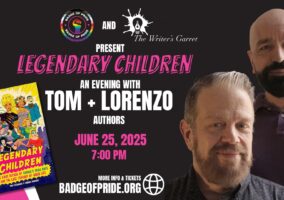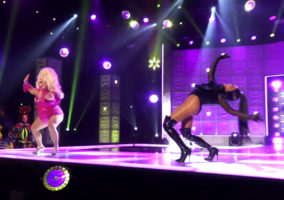
Richard “Little Richard” Penniman, the legendary rock and roll performer who gave us the immortal “Tutti Frutti,” “Long Tall Sally” and “Good Golly Miss Molly” – and whose work inspired generations of rock and pop performers after having been appropriated by a string of white artists – died on Saturday. His unique voice is silent, his struggles are over, but his work and legacies will forever remain. What work it was. What legacies it spawned.
Little Richard exploded into the view, minds, and collective id of mid-20th Century America by serving them several things for which they were wholly unprepared: raunch, sensuality, and gender non-conformity – all wrapped up in a fierce, furious, fiery package of unapologetic Blackness that questioned masculinity and heteronormativity and explored the basest of desires using the soaring vocal and musical styles of a preacher backed by a gospel choir.
Given his changing-with-the-tides feelings about his own sexuality, Little Richard may not have appreciated having it made the centerpiece of his remembrance. Nor should it be; not least because the man did not settle on one idea of himself over the course of his life. There were times in his latter career when he would refer to himself as gay or mention his childhood desire to wear his mother’s makeup. But there were also times when his lifelong faith compelled him to call same-sex desires unnatural and denounce his own nature. The point, if we have to make one, of Little Richard’s queerness is less about how and if he came to terms with it, and way more about how it informed his unique persona and fueled a musical style and stage presence that inspired countless other artists. Whatever struggles he had as a queer man do not necessarily eclipse the difficulties he faced as a Black man in the mid 20th Century music industry or the power his faith held over him, nor do they necessarily have to inform any retrospective of his work, even if it was energetic and boundary-pushing in the way we like to think of queer art.
Just know that the gender-questioning stylings of artists like Prince, David Bowie, Michael Jackson, Boy George, Big Freedia and yes, even RuPaul were able to happen and be accepted widely because Little Richard was out there first in his eyeliner, shaking like he had a sex fever and sending out falsetto ululations that soared out over crowds and airwaves and reached into our souls, filling them with equal parts of joy and longing. Know that any time a pop artist gyrates and wails in his heels, glitter, and makeup, Little Richard was doing it first, at a time and in a position of much greater personal danger to him, making his queer expressions all that much more impressive, his bravery that much more unquestionable.
It is not for us to say what Little Richard was when he clearly had differing answers to that question over the arc of his life. It’s not for us to say what he should have done, how he should have lived, and in what ways he should have spoken of himself. It’s only for us to remember who he was, how he was, and what he did with his time in the context of his times. It is more than enough. Rest well, you king, you warrior, you prophet leading us to the Promised Land.
“Our book Legendary Children: The First Decade of RuPaul’s Drag Race and the Last Century of Queer Life is on sale now!
The Los Angeles Times called it “a nuanced exploration of the gender-bending figures, insider lingo and significant milestones in queer history to which the show owes its existence.” The Washington Post said it “arrives at just the right time … because the world needs authenticity in its stories. Fitzgerald and Marquez deliver that, giving readers an insight into the important but overlooked people who made our current moment possible.” Paper Magazine said to “think of it as the queer education you didn’t get in public school” and The Associated Press said it was “delightful and important” and “a history well told, one that is approachable and enjoyable for all.”
RuPaul’s Drag Race: One-Queen Show Next Post:
WERQ From Home: Emma Roberts Strikes a Pose for Instagram
Please review our Community Guidelines before posting a comment. Thank you!


